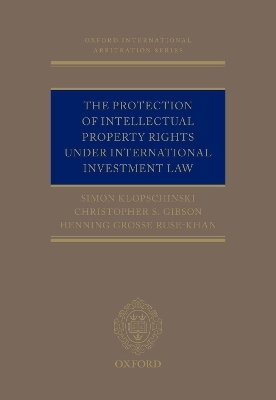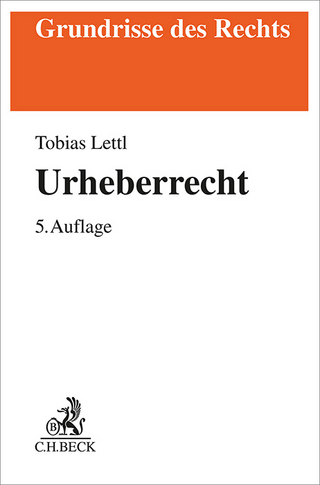
The Protection of Intellectual Property Rights Under International Investment Law
Oxford University Press (Verlag)
978-0-19-871226-8 (ISBN)
- Titel ist leider vergriffen;
keine Neuauflage - Artikel merken
In recent decades, foreign direct investment (FDI) has played an increasingly significant role in world economic activity and development. In economic terms, the accumulated stock of FDI and its generation of commercial activity by foreign affiliates have made FDI comparatively more important than international trade in goods and services. At the same time, the globalization of markets and the development of consumer brands in many domestic markets has brought an increasingly international approach to the management, and value, of intellectual property (IP) rights. IP Rights have therefore become increasingly enmeshed with international investment and the subject of transnational disputes as evidenced by cases that concern, inter alia, various limitations for trademarks used on tobacco packaging, or the invalidation of pharmaceutical patents by domestic courts. FDI is increasingly involved with the exploitation of IP which underpins highly valued products and services and this has shifted the balance of return on FDI from physical to intellectual property. Thus, IP rights have never been more economically and politically important or controversial than they are today.
There have long been international treaties that protect IP, but in recent years other international treaties have come into being that protect IP rights along with other property rights. These treaties include various international investment agreements (IIAs), which regard IP rights as a protected investment.
This book analyses the standards of treatment and protection enshrined in IIAs for IP rights and their relationship to the key international treaties in IP Rights, with reference to topics such as the fragmentation of international law; investor-host-state dispute resolution; investors and investments; relative standards of treatment (such as most favoured nation); absolute standards of treatment (such as fair and equitable treatment); and expropriation.
The work fills the significant gaps left by the comparably small amount of intellectual property related ISDS case-law. As IP Rights are a more recent concern in FDI, many questions regarding the relevance of IIA for IP rights are yet to be decided by investment tribunals. To assist the practitioner in understanding how IP Rights will be treated in investment disputes, the work sets out a number of hypothetical cases based on actual cases decided by other adjudicating bodies in different legal contexts, such the European Court of Human Rights or the European Court of Justice and the work also engages with the issues and applicable law for disputes involving IP Rights arising from the actions relating to Philip Morris trademarks in Australia and Uruguay, and Eli Lilly.
Dr Simon Klopschinski is an associate at Rospatt Osten Pross, an intellectual property firm based in Düsseldorf, Germany, specializing in patent litigation, licencing, competition law, general contract law and commercial law, and the organization of multi-jurisdictional patent litigation in Europe. He received the Otto Hahn Medal for his analysis of the protection of intellectual property by means of investment treaties under international law, which he carried out in the course of his doctoral thesis at the Max Planck Institute for Intellectual Property and Competition Law in Munich and went on to publish in German. Professor Christopher Gibson is an expert in international law, international arbitration, and international intellectual property issues at Suffolk University Law School in Boston. Previously, Professor Gibson was a partner in the London office of Steptoe & Johnson LLP, where he specialized in the areas of international arbitration, intellectual property, and technology disputes and transactions. Professor Gibson teaches and writes in the areas of international dispute resolution, international intellectual property, international trade, and internet law and technology. Henning Grosse Ruse-Khan is a University Reader in International and European Intellectual Property Law at the University of Cambridge, a Fellow of King's College (Cambridge) and an external researcher at the Max Planck Institute for Innovation and Competition in Munich (Germany). Henning's research and teaching focuses on international intellectual property protection and development issues, world trade and investment law, as well as on interfaces amongst legal orders in international law, including transnational law set by private actors.
1: Introduction
2: The Fragmentation of Public International Law
3: Investor-Host-State Arbitration
4: Investment and Investor
5: Relative Treatment Standards: National Treatment and the Most Favoured Nation Clause
6: Absolute Standards of Treatment: 'Fair and Equitable Treatment' and 'Full Protection and Security'
7: Expropriation
8: Conclusions
| Erscheinungsdatum | 11.06.2017 |
|---|---|
| Reihe/Serie | Oxford International Arbitration Series |
| Verlagsort | Oxford |
| Sprache | englisch |
| Maße | 178 x 253 mm |
| Gewicht | 1176 g |
| Themenwelt | Recht / Steuern ► EU / Internationales Recht |
| Recht / Steuern ► Wirtschaftsrecht ► Urheberrecht | |
| ISBN-10 | 0-19-871226-X / 019871226X |
| ISBN-13 | 978-0-19-871226-8 / 9780198712268 |
| Zustand | Neuware |
| Informationen gemäß Produktsicherheitsverordnung (GPSR) | |
| Haben Sie eine Frage zum Produkt? |
aus dem Bereich


